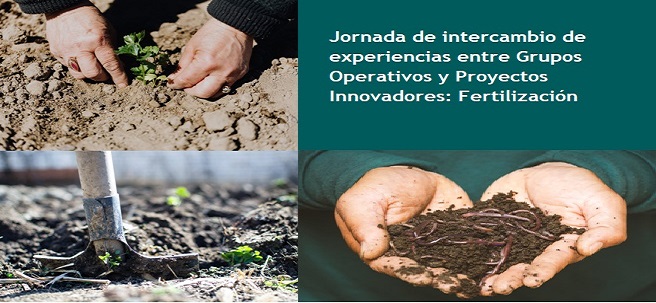
09 de July de 2020
Innovación
10/07/2020 - The National Rural Network (RRN) has organized an exchange of experiences on fertilization, in which 70 people with a heterogeneous profile (companies, technicians, administrations, research centers, agricultural organizations, rural development groups, etc.) from all over the national territory have participated and have shared information and experience on their Operational Groups and/or Innovative Projects, also including projects and thematic networks of the Horizon 2020 Program (H2020).
- The National Rural Network is calling for Operational Groups and Innovation Projects focused on fertilization to exchange knowledge.
- This virtual meeting provided an opportunity to learn about current developments in the field of fertilization, through various projects on fertigation, biological fertilizers, substrate valorization, and sustainable fertilization strategies.
Thematic work rooms
The knowledge transfer process at this meeting took place in three virtual work rooms, where nine Operational Groups and Innovative Projects (including H2020) from regional, national, and European levels converged. Participants exchanged ideas, discussed progress on their work, and presented their results and experiences.
Room 1: Fertirrigation
Participants : iGUESS-MED. Innovative greenhouse support system in the Mediterranean region , GO APGEFERT , and Fertigation Optimization for Early Apricot and Paraguayo under Agrotextile Mesh in the Ricote Valley.
Papers and conclusions : The members of this panel emphasized the importance of effectively managing fertigation to prevent crop diseases and pests . To this end, they developed decision-making systems based on new technologies, such as IoT (Internet of Things) and digitalization. They highlighted the importance of collaboration through consortia , as well as obtaining information on farmers' needs through participatory processes.
Room 2: Innovative Fertilizers
Participants : Smartmushroom , Nutriman and Nutri2cicle
Papers and conclusions : In this area, experts and researchers agree that the valorization of organic substrates reduces fertilizer processing costs, improves farm performance, promotes the circular economy, and eliminates existing environmental problems . They have discussed European Union fertilizer regulations—sharing the idea that sustainable agriculture should be pursued—as well as new technologies available to promote innovative fertilizers.
Room 3: Sustainable fertilization strategies
Participants : MOSOEX , GO FERVAP and SMARTOM .
Papers and conclusions : The members of this room discussed the need to promote soil management models that seek to improve organic matter , reduce greenhouse gas emissions, and reduce erosion on farms.
What is innovation?
The National Rural Network believes that the solution to the problems posed by current development in rural areas must come from sustainable practices supported by research, development, and innovation. Therefore, the EAFRD works with various rural stakeholders organized around the framework of Operational Groups and Innovation Projects.
Operational Groups (OG) are groups of organizations and experts who work together on a problem to be solved or an opportunity to be exploited, using an innovation perspective. They execute a project to put the solutions they have found into practice. Their work is subsidized by the EAFRD through Measure 16 of the Rural Development Programs (RDP). The Ministry of Agriculture, Fisheries, and Food (MAPA) explained the scope of these innovation-boosting grants, their calls for proposals, and the public spending allocated to them within the 2014-2020 rural development policy. The Ministry's work on this topic was also presented, compiling and disseminating the best available techniques, developing marketing and usage regulations, as well as working to develop innovative fertilizers.
This meeting on fertilization is part of a series of meetings on Operational Groups and Innovative Projects that the National Rural Network is promoting to disseminate and share the results of R&D&I carried out in rural areas. All information can be found on the website , as well as on the National Rural Network's social media channels: Twitter , Facebook , and YouTube , where you can enjoy this meeting openly.









